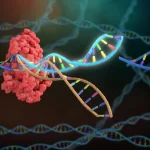
Crispr Gene Editing Triumphs in Treating Hereditary Disorder, Paving the Way for a Medical Revolution
February 1, 2024In a groundbreaking move, scientists have harnessed the power of Crispr gene editing to successfully treat individuals suffering from a debilitating hereditary swelling disorder. The results of a phase 1 clinical trial, published in The New England Journal of Medicine on Wednesday, reveal that a single dose of the Crispr-based remedy led to a remarkable reduction in angioedema attacks for a select group of patients from the UK, the Netherlands, and New Zealand.
The success of this innovative gene therapy not only offers hope to those grappling with hereditary angioedema but also underscores the expanding applications of Crispr technology in healthcare. The positive outcome comes on the heels of regulatory approvals granted by both UK and US authorities for Crispr-based drugs late last year.
Lead investigator Hilary Longhurst, a clinical immunologist at Auckland City Hospital, expressed optimism, stating, “It looks as if the single-dose treatment will provide a permanent cure for my hereditary angioedema patients’ very disabling symptoms.” Longhurst emphasized the immense potential of this treatment approach for addressing various genetic disorders.
Hereditary angioedema is a rare condition, affecting an estimated one in 50,000 people, characterized by severe bouts of swelling that can lead to breathing difficulties and, in extreme cases, be fatal. The Crispr treatment targeted the KLKB1 gene, a key player in the disorder, producing plasma prekallikrein believed to contribute to the biochemical process triggering the swelling attacks.
The 10 patients involved in the trial experienced an impressive 95% reduction in attacks on average after receiving the treatment. Ongoing observation over the next 15 years will assess the long-term safety and efficacy of the therapy, with phase 2 clinical trial results expected later this year.
Sorena Kiani, a consultant immunologist at London’s Royal Free Hospital, commended the results, noting the treatment’s apparent safety and effectiveness. Kiani highlighted the transformative potential of gene therapy, describing it as an “incredible technology” that holds promise for treating various life-threatening conditions.
Intellia Therapeutics, the US genome-editing company behind the angioedema treatment, expressed high encouragement regarding the results. John Leonard, Intellia’s president and CEO, stated that the study provided further evidence of the “immense potential impact” that gene-editing platforms, particularly Crispr, could have on human health.
This achievement follows the historic approval of Crispr-based treatments in the UK for sickle cell disease and beta thalassaemia in November, with the US Food and Drug Administration granting approval for two gene therapies targeting sickle cell disease in December. As Crispr continues to revolutionize the medical landscape, these developments signal a new era in the fight against genetic disorders and offer renewed hope for those in need of transformative treatments.












